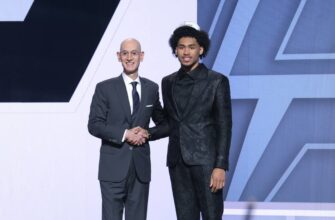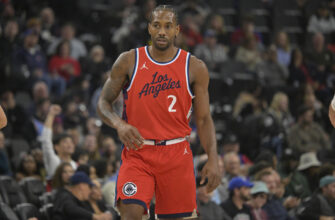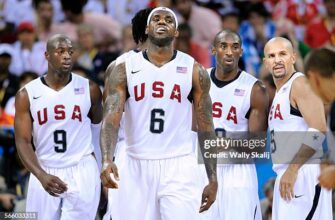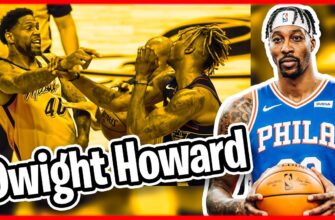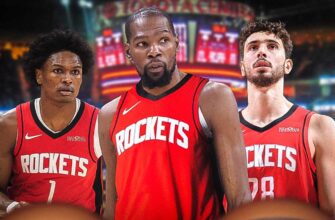During the second half of Game 7 in the 2020 playoffs between the Houston Rockets and the Oklahoma City Thunder, commentators Mark Jackson and Mark Jones were astonished by what they witnessed. They watched rookie Luguentz Dort relentlessly hound the NBA`s leading scorer, James Harden, who appeared utterly frustrated. Everywhere Harden moved, Dort was right there.
With just under three minutes left in the third quarter, Rockets coach Mike D`Antoni called a play specifically designed to free Harden. The plan involved setting three consecutive screens for the All-Star to create some separation from the strong, persistent rookie who had bothered him throughout the series.
First, Danuel House screened for Harden as he cut across the court. Immediately following, P.J. Tucker set another screen behind House, and then Jeff Green provided a third. The idea was that with space, Harden could attack the basket or pass to a rolling teammate.
But Dort powered through all three obstacles, staying attached to Harden. An exasperated Harden, seeing his openings disappear, settled for a long 3-pointer that clanked off the front rim.
“They set three screens for him,” Jackson remarked, sympathizing with Harden`s struggle. “But Dort was able to follow through all three of them and get back into the picture.”
It was this game, and particularly this play, that helped Dort understand the significant defensive impact he could have. “That was my rookie year, so I wasn`t really noticing that I`m actually that good of a defender yet,” Dort told ESPN. “So when they sent those three screens at me, I was like, `God, they trying that much just to get me off his body?`”
Indeed, they were. By the end of the game, Harden seemed exhausted, finishing with just 17 points on 4-of-15 shooting, including 1-for-9 from three – roughly half his season average.
“I can see when someone is getting uncomfortable,” Dort explained. “They`ll start calling for screens, and they want the screener to take my head off. That`s the point where I`m like, `Oh yeah, I got it. He doesn`t like me.`”
Dort didn`t engage in trash talk with Harden during or after the game, stating he only talks back if someone initiates it. “There`s no reason for me to say anything,” Dort said. “Because I already know you`re in hell right now.”
That defensive hell would soon gain a fitting name: “The Dorture Chamber.” Ever since that series, Dort has routinely subjected the NBA`s biggest stars to its confines.

Asked what he wants people to understand about him, Dort`s response is simple and direct: “That I`m not a villain.” He acknowledges that being assigned to guard the best players and making their job difficult can earn him that label, particularly during the intensity of the playoffs. However, he emphasizes that away from the court, he`s a relaxed and friendly person.
While some defensive specialists lean into a villainous persona, Dort doesn`t seek such a reputation. Thunder teammate Aaron Wiggins noted that if an opposing player has a poor game against Dort or suffers an injury during a matchup, Dort genuinely feels bad about it and expresses this in the locker room, making it clear he never intends to cause harm.
Yet, Dort views basketball matchups as a zero-sum game; he either succeeds in stopping his opponent or he fails. Wiggins compared Dort`s defense to a persistent gnat that constantly bothers you – impossible to fully shake off. Dort feels intense pressure to execute his defensive assignments perfectly, fearing that a lapse could jeopardize his place in the league, even despite signing a large contract and earning All-Defensive recognition.
This drive is rooted in his past. Wiggins, who played against Dort in high school, understands his journey. Dort left his home in Montreal at 16 to attend prep schools in Florida, a path many top Canadian prospects take to gain exposure and face tougher competition in the U.S. Dort, the son of Haitian immigrants from the challenging neighborhood of Montreal Nord, described the move to Jacksonville as a significant culture shock, noting he “could barely speak English” initially. However, he credits this experience with building his character. His first coach, Nelson Osse, highlighted the tough environment where many of Dort`s peers ended up in gangs. Despite these challenges, Dort`s talent led him to five-star recruit status and a return to Canada before choosing to play college ball for Bobby Hurley at Arizona State. Hurley quickly saw Dort`s NBA potential.

Hurley emphasized Dort`s immediate impact at Arizona State, crediting his physicality and intensity for giving the team a competitive edge against stronger opponents. Despite averaging 16 points per game as a freshman, the main critique of Dort`s game was an inconsistent shot, although most draft experts projected him as a late first or early second-round pick.
Hurley often spoke highly of Dort`s work ethic and character to NBA teams, sharing stories like how Dort handled a temporary benching with unwavering effort. Believing in Dort`s readiness, Hurley supported his decision to enter the 2019 NBA draft after just one season and even accompanied him and his family to New York.
However, draft night in the Barclays Center green room became a painful ordeal. Thirty players were drafted in the first round, and as the second round began, Dort`s name remained on the board. The wait continued pick after pick, minute after minute, as the room gradually emptied. His name was never called.
The exact reasons for Dort`s unexpected fall in the draft remain debated. Some former executives cited a poor workout that raised concerns about his shooting and ball handling, while others speculated teams were unsure if he was best suited as a 3-and-D player or a scoring guard. Dort knew something had gone wrong. His representatives received calls about playing overseas or accepting non-guaranteed two-way deals.
One team offering a two-way contract was the Oklahoma City Thunder. Coincidentally, Thunder GM Sam Presti had been impressed by Dort`s physicality and determination during an NCAA tournament game where Arizona State played in Tulsa. Dort left the Barclays Center mid-way through the second round of the draft. A few hours later, he agreed to the two-way deal with the Thunder.
“We all cried. Not only him, I cried. His mom cried. We all prayed for him,” said Nelson Osse, Dort`s first coach. He described the high expectations turning into disappointment akin to a funeral. “But once Lu got that call from the Thunder… there was no time for him to cry anymore. He was going to prove to the league that they made a mistake. That was his mentality.”

Dort barely slept that night, eager to get to the team that actually wanted him. The next morning, he flew to Oklahoma City and went straight to the practice facility. Sam Presti was there with a message: “This isn`t the end of your story. It`s the beginning.” Presti presented a detailed development plan, expressing the Thunder`s belief that Dort could become a strong NBA player if he followed it.
“I had so many emotions when I got here,” Dort recalled. “I was sad, I was pissed. But I was also like, `Thank God they gave me this opportunity.`” Mark Daigneault, then coaching the Thunder`s G League team, happened to be at the gym and conducted Dort`s first official workout that afternoon.
That evening, Dort took a ride-sharing service to the temporary housing set up for G League players, without a car or other comforts during that first summer. Eventually, he convinced his friend Greg Gilman, who had been Arizona State`s student manager, to move to OKC to help him train.
Scrolling through social media and seeing friends and rivals enjoying their lives and new wealth was difficult, especially late at night. These moments often drove Dort and Gilman back to the gym. Dort described the Oklahoma City summer as hot and buggy, but free from distractions. Gilman agreed, noting the peaceful environment allowed them to fully focus on Dort`s development and build his career without interference.
During the early part of the 2019-20 season, Dort proved to be everything the Thunder had hoped for defensively. When injuries created an opportunity, Dort stepped into the rotation. A December road trip provided tough matchups against elite guards like Damian Lillard, Donovan Mitchell, Buddy Hield, and Jamal Murray. Dort rose to the challenge, making scoring difficult for each of them.
By the time the Thunder made a surprisingly strong playoff run in the NBA bubble, Dort was a key fixture in the lineup, leading to his assignment against James Harden in that memorable Game 7. Greg Gilman observed Dort`s rapid learning ability, comparing it to artificial intelligence – once he picked something up, that knowledge quickly compounded.
This learning translated to recent matchups as well. In last season`s playoff series against the New Orleans Pelicans, Aaron Wiggins noticed how quickly Dort identified Brandon Ingram`s habits. Dort learned to recognize when Ingram was about to drive based on his ball-handling cues, allowing him to effectively shut down that move. Wiggins noted that Dort`s ability to cut off specific actions forces opponents to adjust. This defensive effort contributed to Ingram shooting just 35% and averaging only 14 points in the series, which Oklahoma City swept.
Dort`s relentless approach has also fueled significant improvement on offense. Though not a natural shooter initially (hitting just 29.7% from three as a rookie), he has developed into a reliable threat, making over 41% this season on a decent volume of attempts. Dort explained that watching film helped him understand how teams defended him, leading to the realization that applying his defensive intensity to his offensive game and hitting key shots would make the Thunder much harder to stop as a team.
Few things energize the Oklahoma City crowd like a flurry of Dort`s high-arcing 3-pointers finding the net. This was evident in a recent playoff game against the Denver Nuggets. After a slow start, Dort hit three crucial threes in a little over two minutes during the fourth quarter, helping seal a Game 5 victory. Teammate Shai Gilgeous-Alexander praised Dort`s confidence in taking those shots regardless of earlier misses, calling it typical of his dedicated work ethic.
Still, defense remains Dort`s undisputed calling card. He recently earned his first All-Defensive Team selection, recognizing his consistent effort over six years guarding the league`s most dangerous players, from guards like Harden to forwards like Minnesota`s Julius Randle.
A notable example occurred in the first game of the recent Western Conference finals. After Randle had a strong start, scoring 20 points on eight shots in the first half, “The Dorture” began. Dort guarded Randle intensely, notably stopping him on four consecutive possessions. With seven minutes left, as Randle tried to post him up, Dort executed a perfectly timed chair-pull, causing the larger forward to fall untouched. Dort then stole the loose ball and ignited a Thunder fast break, leading to a layup that extended OKC`s lead while Randle watched from the floor. Oklahoma City went on to win the game by 26 points.
Greg Gilman summarized Dort`s unique position: “He`s always playing against everybody`s favorite player,” the opposing team`s “hero.” This dynamic often casts Dort as the “villain,” known by nicknames like “Lu the Beast” or associated with “The Dorture Chamber.”

